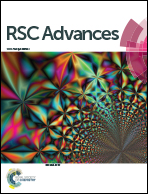A hydrogen sulfide probe activates Nrf2, inhibits cancer cell growth and induces cell apoptosis
Abstract
It has been demonstrated that a relatively high level of endogenous hydrogen sulfide (H2S) promotes cancer cell growth. Thus, reducing endogenous H2S levels with a small molecule that selectively targets H2S in cancer cells is an attractive strategy to treat cancer. In this study, we synthesized a 3-hydroxyflavone-based dual probe (HF-NBD) targeting H2S with favourable photostability, and found that it could also activate the nuclear factor erythroid-2-related factor 2 (Nrf2) and upregulate heme oxygenase-1 (HO-1) expression. HF-NBD inhibited the growth of A549 lung cancer cells, U87 malignant glioma cells and HeLa cervical cancer cells, and induced apoptosis in HeLa cells. Herein we provide HF-NBD, a novel Nrf2 activator that promotes HO-1 expression downstream of Nrf2. The data suggested that HF-NBD might be a potential lead compound for the development of new anti-cancer drugs.



 Please wait while we load your content...
Please wait while we load your content...